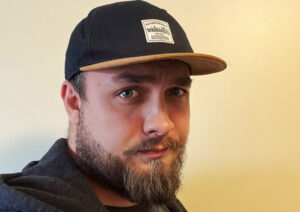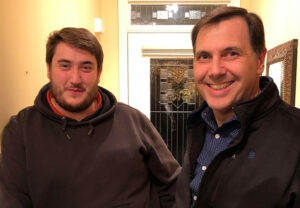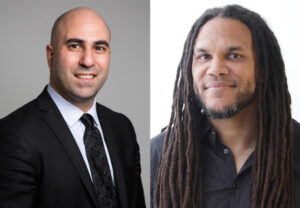Video Game Student Dmytro Salenko Wows Creative Success Award Judges with ‘Mindscape’ Game Pitch

Toronto Film School recently announced Dmytro Salenko as the inaugural winner of its newly launched Creative Success Award.
For Salenko, a Video Game Design & Animation student, being selected as the first-ever recipient of the quarterly $2,500 bursary meant the world to him – not only proving that all his hard work and dedication is paying off, but also encouraging him to keep going.
“It is not just about the recognition for my game design work; it is also a big help financially… It means I can focus more on my studies and keep doing what I love,” he said. “I am incredibly grateful for this support and excited about the doors it may open for my educational and creative journey.”

Dedicated to the memory of 2019 Video Game Design & Development program grad Kurt Huhn, the Creative Success Award is awarded not on academic merit, but rather to first-term gaming students who demonstrate those attributes most admired in Kurt – namely, his passion, potential and creativity.
“On behalf of my family, I am extremely honored to know Kurt’s legacy lives on through the Creative Success Award at TFS. This first winner is a testament to what Kurt stood for – quality and innovation,” said Kurt’s father, Kevin Huhn, himself a Film Production grad who now serves as TFS’s Manger of Student Engagement & Community.
“We are grateful and truly hope this Award helps make a difference in the winners’ lives.”
As part of his application for the Creative Success Award, Salenko – had to propose his best pitch for a game design. He pitched the idea for Mindscape – a third-person, sci-fi survival horror game set against the “enigmatic” backdrop of a distant, uncharted planetary system.
“Merging ambient narrative exploration with environmental puzzle-solving, tight corridor combat, and atmospheric tension, the game invites players into a world where the line between reality and Lovecraftian eldritch horror blurs,” Salenko explained.
“Mindscape focuses on crafting a relentless atmosphere of suspense and tension, akin to the harrowing experience found in survival horror classics, while weaving a tale of cosmic mystery and psychological depth.”

As members of the award’s selection committee, Jean-Paul Amore and Rob Elsworthy, the directors of TFS’s Video Game Design & Development and Video Game Design & Animation programs, respectively, were duly impressed by Salenko’s vision for Mindscape.
“Mindscape distinguishes itself through its combination of survival horror and sci-fi genres, while adding unique empathetic gameplay mechanics. The game not only tells a story, but elevates storytelling by immersing players in an interactive narrative,” Amore said.
“Dmytro’s pitch meticulously outlines the game’s core mechanics, narrative ambitions, and artistic inspirations, presenting a clear vision of a game that leaves us anticipating the game’s realization.”
Added Elsworthy: “Mindscape ingeniously combines the psychological depth of Lovecraftian horror with innovative gameplay mechanics like temporal manipulation and a dynamic sanity system, offering players a journey through a meticulously crafted sci-fi horror universe,” he said. “The pitch stood out for its unique blend of narrative-driven exploration, and psychological depth that will connect with fans of the survival horror genre.”

A lifelong fan of video games, Salenko said many of his best gaming memories are of him playing survival horrors like Dead Space, Gears of War, and Elden Ring for countless hours on end with his dad.
“It was these shared experiences that planted the seed of creating my own game – a game that could capture our imaginations just as much. After my father’s passing, I wanted to make a game he would enjoy playing. This is why I chose a horror game, a genre my dad was an avid fan of,” he said, noting that, in crafting Mindscape, he aimed to blend the most compelling aspects of the horror games he’s admired over the years.
“The narrative draws inspiration from the chilling tales of H.P. Lovecraft, exploring themes of the unknown and the overwhelming sense of vulnerability in the face of cosmic horrors. It’s a journey into the psyche, revealing the fragility of the human condition against the vastness of the void.”

Salenko also drew inspiration from the artworks of H. R. Giger and Zdzisław Beksiński, whom he described as “the masters of dark surrealism,” famous for their artistic ability to blend the eerie with the exquisite.
“Their ability to evoke emotion through otherworldly landscapes and haunting visuals has been instrumental in shaping the aesthetic and atmosphere of my game – well, at least how I’ve imagined it,” he added.
In his application for the Creative Success Award, Salenko was also tasked with explaining his approach to design team leadership – for him, a multi-pronged style involving vision and direction, open communication, empowerment and ownership, adaptability and problem solving, continuous learning and improvement, and inspiring passion and dedication.
“Leading a team full of creative talents is no minor feat. Everyone knows making games isn’t smooth sailing. There are always surprises and things you can’t predict that can throw off your plans and make working together tricky,” he explained.
“Personally, I’m all about teamwork, creativity, and planning ahead. I believe the best games come from a team where everyone’s ideas are valued and everyone’s working together.”
Applications for this term’s Creative Success Award are now open! Video Game Design & Animation and Video Game Design & Development students who are in their first term are encouraged to apply today at https://mytfs.ca/my-tfs-on-campus/creative-success-award/#


